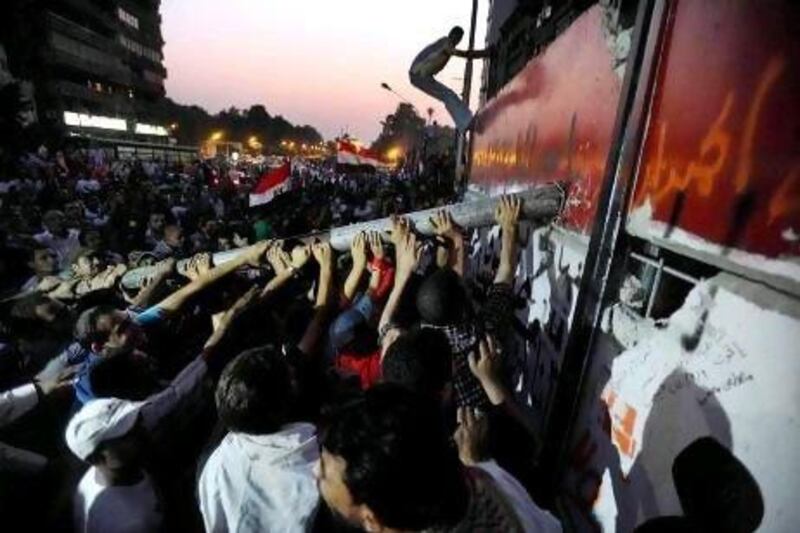Late last August, the aftershocks of the Egyptian uprising reached the Israeli Embassy in Cairo. Urged on by a crowd of demonstrators angered over Israel's killing of several Egyptian soldiers on the Sinai border after militants had carried out a bold attack inside Israel, Ahmed Al Shehat scaled the 22-storey building in Cairo's Giza neighbourhood and snatched the Israeli flag down, replacing it with Egypt's.
Three weeks after the so-called "flagman" incident, protesters marched from Tahrir Square to the embassy, tearing down a concrete security wall. After clashing all night with police amid a haze of tear gas, demonstrators stormed the embassy, seizing classified documents and flinging them from the windows. As this drama was unfolding in Cairo, Benjamin Netanyahu, the Israeli prime minister, convened his security cabinet in Jerusalem and anxiously awaited information on the fate of the embassy's stricken staff.
These protests were sparked by a chain of events that had begun with a pair of routine but deadly Israeli attacks in Gaza. Two days after those strikes, Egyptian gunmen launched a three-pronged attack using Kalashnikovs and a roadside bomb near the Red Sea resort town of Eilat, killing six civilians and one soldier. Israeli forces pursued the attackers across the Egyptian border, killing several soldiers in the process. Three nights of Israeli air raids on Gaza, killing 14 Palestinians, followed this cross-border violence. Further stoking Egyptian anger, Israeli defence minister Ehud Barak refused to apologise for the deaths.
The ransacking of the embassy, one of only two that Israel maintains in the Arab world, was a stark illustration of a new political reality: Israel could no longer rely on its stalwart ally, the ousted former president Hosni Mubarak, to suppress Egyptian opposition to Israeli military action in Gaza, in the Sinai or elsewhere.
Any overreaching by Israel risked the safety of its diplomatic staff and the stability of its diplomatic position in Egypt, Israel's largest and most important neighbour. Political instability in Egypt, coupled with a deepening sense of isolation in Israel, creates a situation in which radical posturing can be used for cheap political gain. The flagman episode aside, both governments will respect the peace treaty between the two, but resentment of Israel will remain a fixture of Egyptian political reality, while fear will continue to dominate the discourse in Israel. Several officials confirmed the embassy protests marked a turning point. Egypt's former ambassador to Washington, Abdel Raouf El Reedy, said in an interview in his high-rise overlooking the Nile: "I think the Israelis are going to be more careful about shooting, because it demonstrated that it could grow into a big problem for both sides. And it cannot be guaranteed that they [Egyptians] will be controlled. It was a lesson."
Through conversations with the generals, ambassadors, secret policemen and intellectuals who have been at the crossroads of this uneasy marriage between Egypt and Israel for the last 30 years, a picture emerged of a relationship built on steady foundations despite the shift in dynamics and the overheated rhetoric emerging from the mainstream press in both countries. Contrary to dire predictions from some Israeli officials as well as right-wing commentators in the United States playing on fears of a hardline Islamist administration in Egypt, the country's newly elected president, Mohamed Morsi, will not withdraw from the peace treaty with Israel, nor can he afford to curtail security cooperation, given the two countries' mutual interest in maintaining calm along their shared border. The question now is whether Israel's leaders understand that while the treaty is safe, their military options have changed.
During the embassy protest, Egyptians were in the streets in their thousands, emboldened by the toppling of Hosni Mubarak. By contrast, Israelis recoiled in fear, interpreting the new Middle East reality as one even more hostile to their country. "Israelis just see Islam in front of their eyes. We just see green banners and green flags which makes us very afraid. It is hard to convince people that Egypt has a system of checks and balances," said Zvi Bar'el, a senior writer for the Israeli newspaper Haaretz, in an interview describing Israelis' reaction to Morsi's election.
Israeli fears, while exaggerated, are not entirely unfounded. Egyptian support for the Palestinian struggle, and opposition to the old regime's collusion with Israel, has long been a point of unity among the very revolutionaries who ousted Mubarak. A deal brokered by his cronies to sell natural gas to Israel has provoked anti-regime invective for years. A host of other policies added to the discontent, including the 2004 creation of US-backed Qualifying Industrial Zones for processing Israeli materials. Ultimately, the regime's complicity in the Israeli siege of Gaza, its acquiescence in the 2006 Israeli war on Lebanon and the 2008-2009 assault on Gaza cemented the widespread impression of Mubarak as a lapdog of the US and Israel. In fact, some of the activists of the 2011 revolution had cut their teeth clashing with Mubarak's police in Cairo during the early days of the Second Intifada. Since the revolution, some protesters have called for a reformulation of Egypt's border policy with Gaza, resulting in a slight relaxation of some restrictions at the Rafah border crossing.
The contours of the Egyptian-Israeli relationship have been tested in the Gaza Strip. It is Israel's ability to conduct military operations in Gaza that stands to be the most consequential casualty of the revolution. Although Israel has proven itself to be nearly impervious to public outbursts against its policies in the past, the facts of the new political situation in Egypt have not been lost on some Israeli officials and observers.
One of these observers is professor Yoram Meital, the chairman of the Chaim Herzog Centre for Middle East Studies and Diplomacy at Ben Gurion University. He said, switching between Hebrew and English: "Since the toppling of the Mubarak regime in Egypt, the most significant change for Israel has been its ability to manoeuvre militarily in Gaza. The capacity has been very significantly limited and operations such as Cast Lead are still possible but, to my mind, Israel would be taking a huge risk since any major campaign in Gaza would severely hurt Israeli-Egyptian peace.
"In the past, Israel operated in a bilateral way, between Israel and the Palestinians, but it is no longer bilateral, it is multilateral to include Egypt. For the past 30 years, Israel has built its economy and military around the peace with Egypt. Any operation in Gaza today would put that at risk."
Furthermore, the American observer Geoffrey Aronson of the Washington-based Foundation for Middle East Peace, pointed out that since the fall of Mubarak, Israel actually has had more ability to destabilise the situation in Egypt if it chooses, but this fact increases the incentive for caution.
"On the one hand, Israel has, in a sense, more power to affect the domestic political environment in Egypt," he said. "Were it to embark on an operation in Gaza, the Egyptian political environment would be more responsive to that today than it would have been five years ago.
"Now, ironically, they may feel more constrained today despite the fact they have more power. Because of the inherent volatility of the environment in Egypt they may not want to push it over the edge," he added in an interview in the garden of a Cairo hotel.
However, the primary source of worry for Israelis is not the slogan-shouting protesters in Tahrir Square, nor the stricken Palestinians of Gaza. Rather, it is Egypt's newly elected Muslim Brotherhood-affiliated President Morsi, who appears to be the very embodiment of what one government official recently called the "Islamic winter" that Israelis see following the Arab Spring.
One reason these remarks are so pervasive in Israeli media is that the brotherhood has consistently pledged to support what it calls the "legitimate rights" of the Palestinians, a promise reiterated in Morsi's inaugural address.
However, when one looks beyond the predictable populist anti-Israel language, the Muslim Brotherhood lacks impetus or the desire needed to seriously fracture the relationship that has been a cornerstone of Egyptian foreign policy for three decades. Rather, party officials have offered confusing and sometimes contradictory statements that appear tailored to the prevailing political sentiments of the day. Amid these shifting currents, one thing is now clear: the peace treaty will remain in place.
In fact, Morsi himself has repeatedly promised to honour the treaty. In a televised speech the night he was declared the winner, Morsi said he would "respect international agreements", a widely understood reference to the Israel treaty.
Egyptian officials and security experts agree that Morsi is sincere in his commitment to the treaty. Namira Negm, a professor at the American University in Cairo and a councillor on leave from the Egyptian foreign ministry, said that any Israeli concerns about Morsi's intentions are unfounded.
"I think most of those who even run for presidency or the people who ran for parliament, even with the political rhetoric in the campaign, no one said: 'We are going to wage war with Israel today'," she said.
Other Egyptian officials also dismiss aggressive brotherhood rhetoric as hot air. Egypt's former US ambassador El Reedy added: "I believe that Morsi and the Muslim brothers are aware of the importance of maintaining the peace treaty. They may talk differently but they talk about Israel and they talk about Israel's aggression against Arab countries and its occupation of the land and its policies contrary to human rights and regarding the Palestinians - all that," he said.
“But, basically, the Muslim Brotherhood is also determined, they have actually said that they will maintain the commitment to the international treaties.”
Even Hossam Khairallah, a career military officer who served as a senior official in Mubarak’s notorious intelligence services, and who ran for president in the recent election, said of the Brotherhood: “They are not like the image that you’ve heard of them. They will be more pragmatic.”
On the other side of the border, despite Israelis’ anxieties about Egypt, senior military officials said the country is cognisant of the importance of the peace treaty. According to Giora Eiland, a retired major general and former national security adviser, Israel has structured not only its military but its entire economic foundations based on a long-term peace agreement with Egypt. He noted that Israel has been able to reduce military spending from 33 per cent of its GDP to six per cent since 1975, “and this is largely because the peace agreement with Egypt has allowed us to restructure the resources devoted to the military”.
Moreover, Eiland argued, the status of the treaty may not be the critical factor in the future of the relationship. “The peace agreement is not that important from the Israeli military perspective. What is important is the absence of the preparation of war,” he said. In other words, unless Egyptian tanks begin rolling across the Sinai, the Israeli military won’t be losing sleep over fiery rhetoric emanating from Cairo or Jerusalem.
There is one area, however, that the Israeli military is actively monitoring in relation to Egypt – the increasingly lawless Sinai Peninsula. Since Mubarak was deposed, the old regime’s police state melted away from much of this rugged region, where Israel and Egypt fought three separate wars. This power vacuum has been filled by Bedouin tribes, allowing smugglers and militants to operate unencumbered. The situation in the Sinai has direct implications for Israel’s security. Since the end of the revolution, militants have attacked the pipeline carrying Egyptian natural gas to Israel as many as 14 times, hastening the cancellation of a gas deal between the two countries. Militants have also fired rockets across the border, prompting Israel to announce the deployment of an anti-missile battery near the border town of Eilat. According to the retired general Sameh Seif Al Yazal, Egypt has permitted some Egyptian jihadis to return from Afghanistan and Pakistan. “All of them decided to come directly from the airport to the Sinai,” he said.
The lawless situation in the Sinai is exemplified on the border with Gaza, where a network of smuggling tunnels has further grown since the fall of Mubarak. The tunnels allow Palestinians to import goods made scarce by an Israeli blockade, including food, fuel, consumer goods, medicine, even large appliances and cars. But the tunnels are also said to supply weapons, many of them smuggled from Libya, a country still reeling from post-revolutionary chaos.
While Egypt has so far shown no willingness to violate the restrictions on troop movements, Israel did just that after a brazen attack last month on Israeli contractors constructing a fence along the Sinai border. Following the attack that killed one Israeli contractor of Palestinian origin, the Israeli army made the unprecedented move of briefly repositioning a number of tanks and heavy machinery directly in the border zone, in clear violation of the peace agreement.
For the last 33 years Israel’s strategic calculus has depended on the peace agreement with Egypt. Israel has structured its military and its national psychology with the tacit understanding that Egypt will not only refrain from war with Israel but that it will also not interfere with Israel’s occupation of Palestinian land. This understanding means that serious change to the relationship with Egypt is unlikely, or at least, very difficult to implement, even by the current right-wing Knesset. For the moment, however, there is little indication that Israel’s ruling right-wing coalition, and its backers at home and in the US, fully understand the transformation of politics in the Middle East. In a recent pair of widely disseminated columns, Robert Satloff, director of the prominent pro-Israeli Washington Institute for Near East Policy, likened the Muslim Brotherhood both to the hardline regime in Iran and to Al Qaeda. Satloff’s failure to differentiate these entities is a perfect example of the flawed and facile thinking that dominates certain influential policy circles.
In the last 18 months, a tectonic political shift rocked the Arab world, toppling three dictators and undermining authoritarian governments everywhere in the region. Standing in the middle of this sweeping change is an Israel (and a Palestinian leadership) that appears ever more out of sync with the cross-currents of change. Rather than bitterly decrying recent developments as a continuation of irrational Arab hatred, Israeli officials could regard the current moment of transition as a rare opportunity to recast their country’s position in the region, beginning by resisting the tendency for aggressive military action in the occupied territories or neighbouring countries. Israel’s present-day leaders might recall that the 1978 peace talks between prime minister Menachem Begin and Egyptian president Anwar Sadat, brokered by US president Jimmy Carter, which ultimately resulted in the peace accord, also produced another document – A Framework for Peace in the Middle East, in which Israel agreed to withdraw from Palestinian territory in exchange for a negotiated peace.
Anyone hoping to understand the changes in the relationship between Egypt and Israel must look beyond the peace treaty and consider how recent moves in Egyptian politics will affect the foreign policies of the two countries. Emboldened by their revolution, we can expect Egyptians to express their deeply held political convictions, starting with support for the Palestinians, without fear of reprisal from thuggish security forces. Of course, Egypt’s transition to democracy has been halting and provisional.
For the moment, President Morsi will likely have less influence over security and foreign policy than the generals who took power when Mubarak stepped down. Pressing social, political and economic issues will surely consume more of the new president’s attention than his country’s cold peace with Israel. In the long term, this will mean that the Egyptian people’s sympathy for Palestinians and disdain for Israel will remain a potentially explosive factor. In the words of the retired Egyptian general Adel Sulaiman, who as a young soldier was part of the force that crossed the Suez Canal in a small rubber boat amid a hail of gunfire during the 1973 war, “the Egyptian people want peace. They don’t want normalisation.”
Joseph Dana is a journalist based in Ramallah. Jared Malsin is a journalist based in Cairo.





